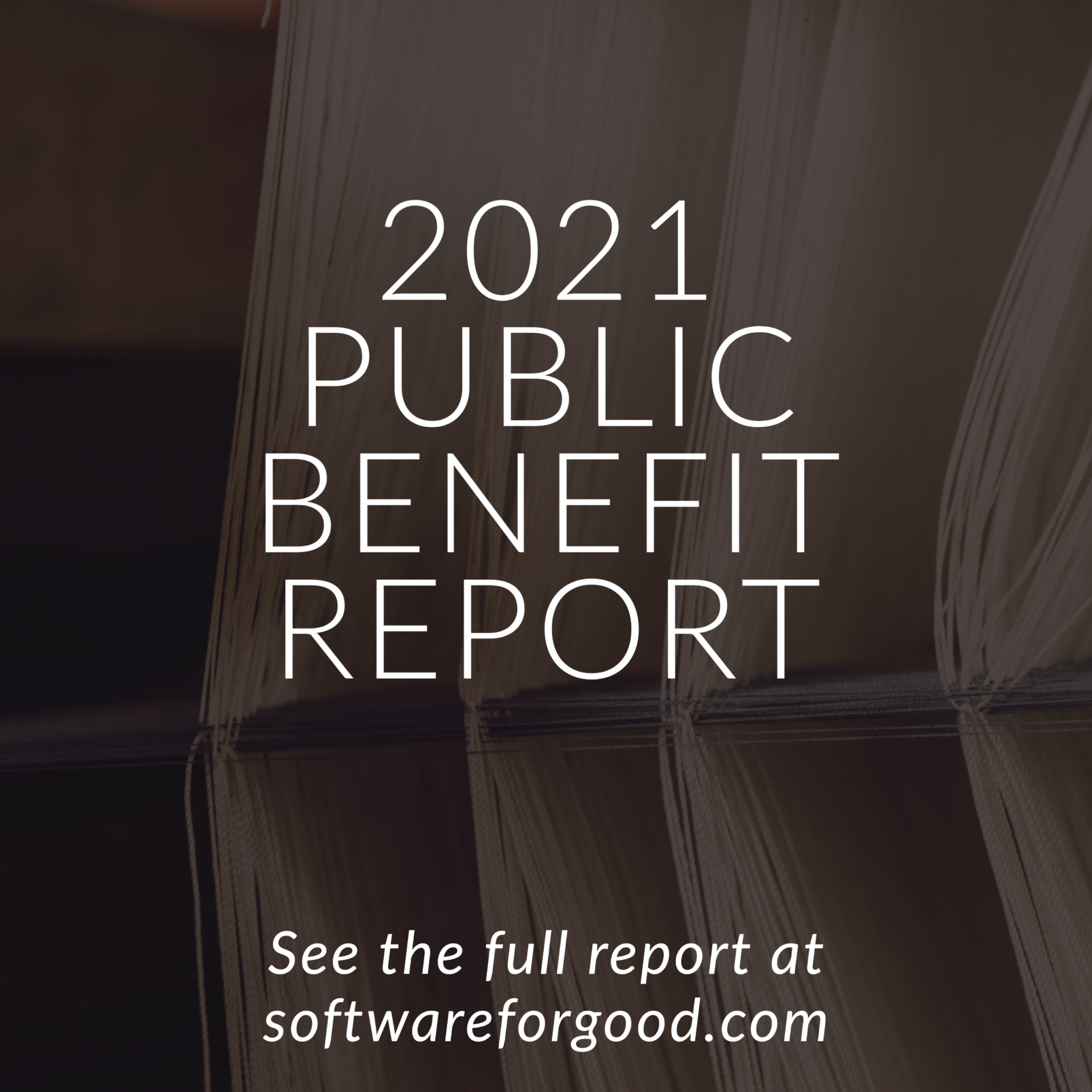As a public benefit corporation, we create an annual report on our “for good” efforts to submit to the State of Minnesota.
For 2021, we shared highlights from our work on community first public safety, accessible and transparent affordable housing, driving inclusion in the tech industry, and participating in conversations about the future of tech for good.
Take a look at our impact report:
Tech for inclusion and transformation
In 2021, we continued to feel the acute potential and responsibility of using technology to support positive impact. From the earliest days of the year, we witnessed threats to the future of democracy and the planet. We continued navigating a global pandemic and marked the one-year anniversary of George Floyd’s murder, shortly after hearing guilty verdicts for Derek Chauvin. We watched billionaires take self-funded trips to space and new tech trends dominated by people focused on making money, while inequality and climate crises continue to grow.
These challenges call us to constantly consider Software for Good’s impact and how we can improve. As a public benefit corporation, we don’t measure growth and success by profit alone. For us, growth means helping human beings solve bigger problems and build stronger solutions for the benefit of people and planet.
Within the team, we’re envisioning what the next few years look like: working on bigger, more complex projects; supporting democracy, justice, and community action; using human-centered design to ensure anything we build is ethical and inclusive; and ensuring that our team and contractors can maintain a high quality of life.
Naturally, we can’t do this alone, and we’re eager to keep partnering with organizations doing good and learning alongside fellow practitioners. This report shares highlights from the past year and our ongoing commitment to pursue benefit to people and planet as well as profit.
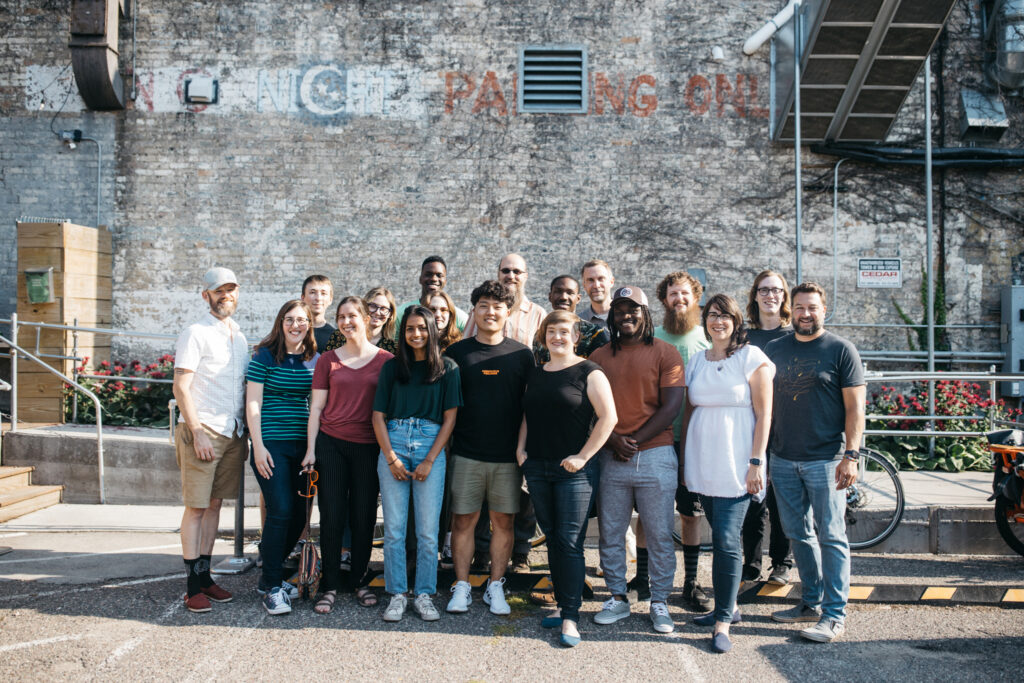
In 2021, Software for Good…
• Supported positive parenting skills for families who have experienced trauma by launching two new websites and a Learning Management System for our client ADAPT
• Helped Shelter Animals Count improve animal welfare nationwide by launching their new data portal, which captures information from animal shelters and rescues that the organization uses for analysis and reporting
• Launched the website for ConnextMSP, a growing program of GREATER MSP that helps ensure career opportunities for young BIPOC professionals
• Evaluated the City of Saint Paul’s supplier platform, where vendor companies can bid to work on projects with the city, and recommended ways to make it more accessible and inclusive
• Helped our client Tanka Fund meet their goal of raising more than $50,000 during the Support the Return campaign, which funds projects that restore buffalo to Native lands and communities
• Enhanced developer teams at several companies using tech to deliver health and wellness coaching, diabetes care, and more
• Explored the future of public safety with our client The Black Response as they prepare to launch a holistic alternative emergency alternative response (HEART) program
• Continued to partner closely with HousingLink as they roll out Housing Hub, a platform we built to make affordable housing waitlists simpler and more accessible
• Partnered with The Coven, Techquity, and Open Twin Cities to host a Q&A with Shalini Kantayya, director of the documentary Coded Bias
• Was featured in Twin Cities Business Tech 20 as founder and CEO Casey Helbling was recognized alongside other Minneapolis-Saint Paul leaders
Investing in good
70.5% of 2021 revenue from projects with purpose-driven organizations
$200,000 awarded to Software for Good in a competitive grant to support our apprenticeships, as part of the Tech Training Pilot Program from the Minnesota Department of Employment and Economic Development (DEED)
$10,000 contributed by Software for Good through the Venn Foundation to support organizations like TechDump, which combats electronic waste while providing opportunities for formerly incarcerated people
230 average hours of paid time off logged by each employee
In 2021, we sponsored:
• Pollen, a media arts organization that promotes empathy, connection, and action through storytelling and events
• The Coven — our Gold sponsorship supported their Brave Space Salon series, an exploration of the anti-racism journey led by The Woke Coach
• Black Tech Talent, supporting their first-ever Summit for job seekers, employers, entrepreneurs, and students
• City of Minneapolis’ Trans Equity Summit, where we also participated in the virtual career fair

New funding to make tech more inclusive
2021 marked the fifth year of Software for Good’s giving and internship program, which pairs up-and-coming tech professionals with mission-driven organizations to provide hands-on, for-good experience. This summer, the program was awarded a competitive grant as part of the State of Minnesota’s Department of Employment and Economic Development Tech Training Pilot Program!
The grant funding allows us to expand our apprenticeship program in software engineering and human-centered design, and to create more opportunities for young adults who are Black, Indigenous, and people of color.
That’s why we’re now calling it an “apprenticeship.” Because of the goals of the DEED funding and the work experience our program offers, we see working with Software for Good as a step between learning tech skills and being ready for a full-time job.
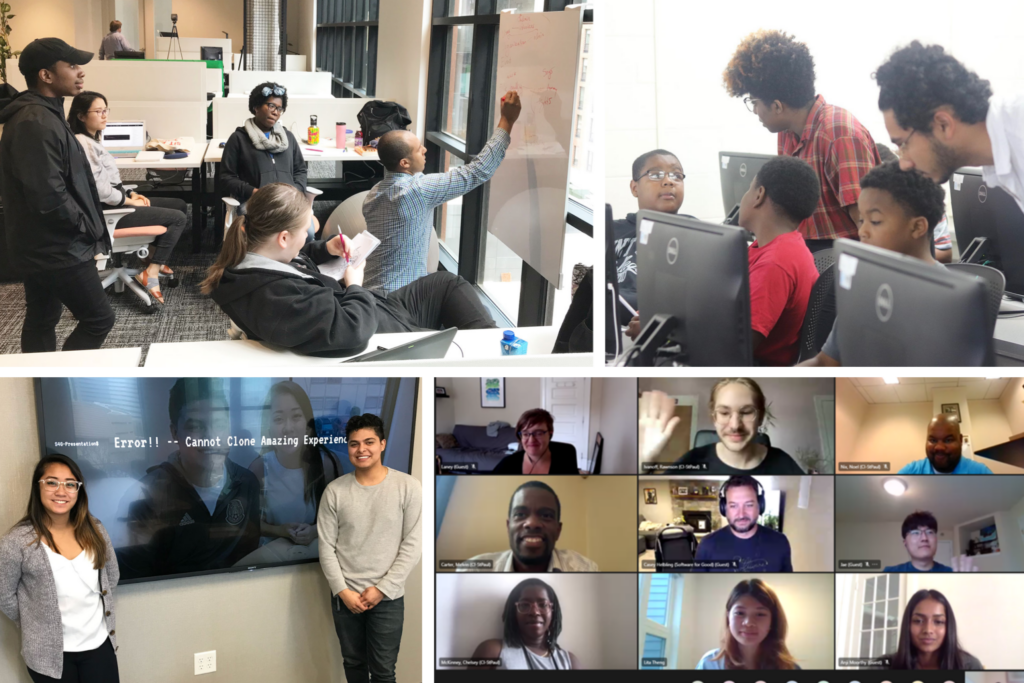
Apprenticeship highlights from 2021:
• Our summer interns met with Mayor Melvin Carter to present their work on the Budget Game, an online version of an activity that helps Saint Paul community members understand the city budgeting process and share their priorities
• We partnered with Prime Academy and the City of Saint Paul’s Right Track as part of their first-ever UX Academy program, which trains young people in UX design and research skills and places them in internships — we hosted one intern from the program during the summer
• We met with DEED Commissioner Steve Grove, fellow Tech Training grantees, and partners like 30,000 Feet and Black Tech Talent to discuss how this program can equip young BIPOC professionals to pursue careers in tech
In 2022, we plan to:
• Achieve the goals of the DEED grant by working with up to 20 new tech professionals and helping them find full-time work in the industry
• Share what we’ve learned with fellow tech companies and organizations that work with apprentices
• Look ahead to the future of the program, including continuing to partner directly with training programs, employers, and mentors to ensure that participants are prepared for successful, fulfilling careers
Exploring the future of public safety
In 2021, conversations about the future of public safety continued to draw new attention in response to police killings and oppressive practices. Software for Good had the chance to jump into these discussions firsthand — and consider how technology can play a part.
In April, we were introduced to The Black Response Cambridge, a grassroots group in Massachusetts leading calls for an alternative, non-police emergency response option in their city. After meeting with the coalition of organizers, nonprofit professionals, and elected officials, we began researching and exploring how tech could support a new program called Cambridge HEART — Holistic Emergency Alternative Response Team.
Software for Good’s team interviewed service providers in Cambridge, from established nonprofits to volunteer street teams; reviewed community surveys and reports; and talked to alternative response teams in other cities, such as Oregon’s long-running CAHOOTS program. We explored partnerships with tech solutions that already exist, including RAHEEM, a company building tech infrastructure to support non-police emergency response.
During the project, we presented our findings to the Cambridge City Council and the members of the HEART coalition, helping the team advocate for funding and support as they launch.
Currently, the HEART program is training first responders, working on a partnership with the City of Cambridge, raising money, and preparing to officially start responding to calls this year. We’re excited to see them grow — and to keep applying what we’ve learned about alternative public safety programs as these initiatives expand around the country.
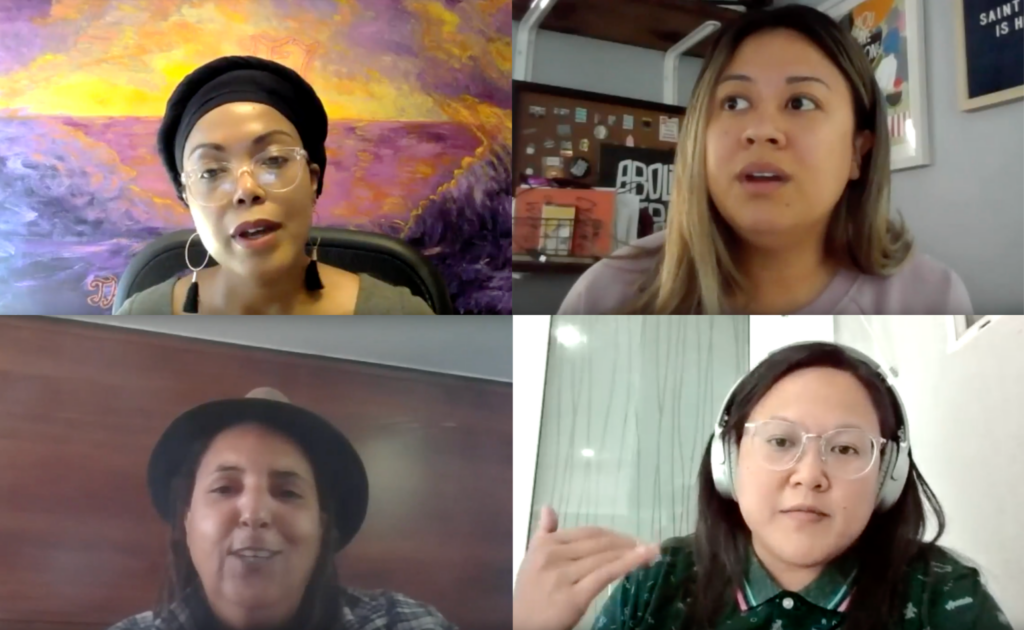
Reimagining 911 at Code Switch
In September, we partnered with Techquity and Open Twin Cities to host the sixth annual Code Switch, a hackathon focused on disrupting inequity and driving community-led change. Code Switch coincides with the National Day of Civic Hacking hosted by Code for America, so we shared their theme for this year: Reimagining 911.
For the second year in a row, we kept Code Switch virtual and encouraged teams to work for up to a month on projects involving open source tech, open data, and/or human-centered design. For the kickoff event, we assembled a powerhouse panel of Minneapolis–St. Paul leaders:
• Acooa Lee Ellis, Greater Twin Cities United Way
• Mitra Jalali, Saint Paul City Council Member
• Irene Fernando, Hennepin County Commissioner
• Rox Anderson, Relationships Evolving Possibilities (REP)
The speakers invited participants to explore many ideas about 911 and safety: What would you want to happen when you’re in an unsafe situation and need support? How do you want help to show up? How do we define what success and accountability look like when introducing new ideas? What would it mean for public safety and emergency response to be life-affirming?
The speakers noted that there are many ways to innovate on 911, including iterating on the current system and exploring alternatives. Next, participants continued brainstorming and shared pitches about specific projects — from developing an open data standard for 911, to prototyping an Uber-style star rating system for first responders.
In the month after the kickoff, participants had the option to continue working through Open Twin Cities’ Slack workspace and weekly virtual meetups. At the end of the month, we gathered virtually again to share results and discuss how to carry these insights and ideas forward.
“The power resides in the hands of the people,” said Sharon Kennedy Vickers, Chief Information Officer at the City of Saint Paul and co-founder of Techquity, during the wrap-up event. “As technologists, we have a real opportunity in putting information out.”
The challenges with public safety remain active and urgent — and so do the opportunities for us all to use our skills for change.
Sharing insights about tech for housing relief
In 2020, we worked with our partner HousingLink and the State of Minnesota to support the state’s distribution of millions of dollars in COVID-related housing relief — launching the software in just a few weeks.
In 2021, we sunset the software after the COVID-19 Housing Assistance Program wrapped up. And we began sharing the lessons we’d learned from collaborating with government and a nonprofit to build something quickly and iterate over time, such as:
• Trust and flexibility. Because of our previous work with HousingLink and their relationship with the state — and given the extremely short timeline — we were given the trust and flexibility to build toward the ultimate goals of the project, rather than being prescribed detailed specifications.
• Meet people where they’re at. We worked to support people throughout Minnesota who may not have add access to internet or a printer. While the state initially insisted on an ink signature for the application, talking to program administrators after launch made it clear that this was a barrier, and we updated the software to support digital signatures.
• Evolve in response to new information. At first, the software was designed for families to receive assistance just once, but as the pandemic and its challenges went on, some people needed additional support. A few months after the initial launch, we rolled out a major update to allow for returning applicants.
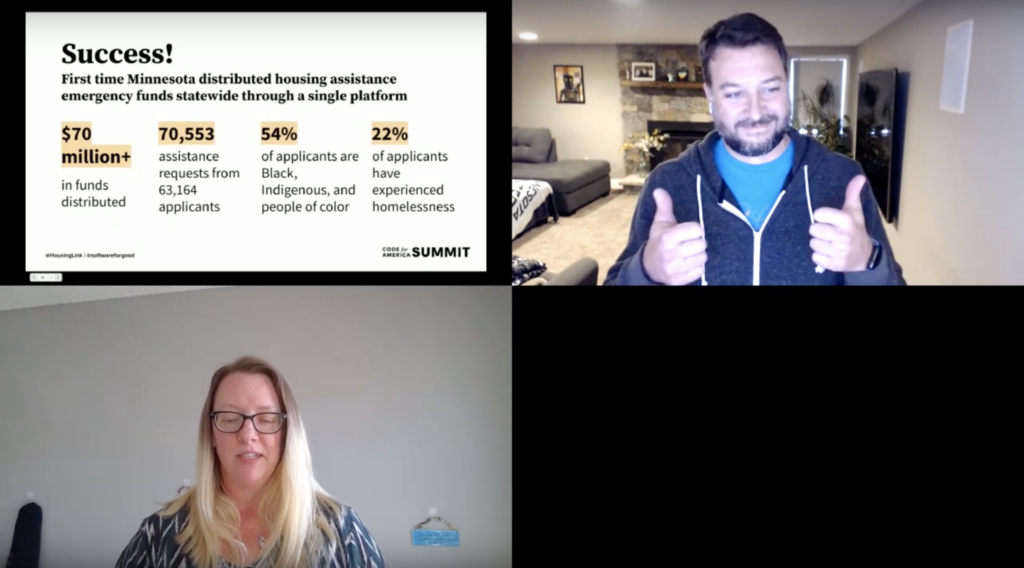
2021 speaking appearances:
We shared the lessons of the COVID-19 Housing Assistance Project alongside HousingLink’s president, Sue Speakman-Gomez, at the following virtual conferences:
• Code for America Summit (watch the video)
• Good Tech Fest
• TechConnect (hosted by Minnesota Technology Association)
• Tech Forward (hosted by TechImpact)
• Code for All Summit
• Minnesota Community Action Partnership (MinnCAP)
The project is also featured as a case study in the Civic Design Library, curated by Rosenfeld Media and the Beeck Center for Social Impact + Innovation at Georgetown University.
Our team also spoke at:
• Genesys Works–Twin Cities’ College & Career Connections Conference
• Career Pathways for Women in Tech (hosted by Minnesota Technology Association)
• Twin Cities Startup Week
Want to partner with us to use technology for impact in 2022? Send us a note.

